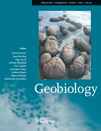
Geobiology
metrics 2024
Fostering Dialogue on Climate Change and Biodiversity
Introduction
Geobiology, published by WILEY, is a prestigious journal at the forefront of interdisciplinary research in Earth and Planetary Sciences, Ecology, and Environmental Science. With an ISSN of 1472-4677 and an E-ISSN of 1472-4669, this journal has achieved remarkable recognition as evidenced by its Q1 categorization in multiple relevant fields, including Earth and Planetary Sciences, Ecology, and Environmental Science, according to the 2023 quartile rankings. Covering a diverse range of topics from biogeochemical cycles to the impacts of climate change on biodiversity, Geobiology serves as a vital platform for researchers, professionals, and students alike. The journal boasts impressive Scopus rankings, placing it within the top tiers of its fields, which is indicative of its significant influence and contribution to advancing knowledge. Although it does not operate under an Open Access model, Geobiology ensures widespread reach and accessibility, allowing for impactful dialogues within the scientific community. Researchers are encouraged to submit their findings and engage with cutting-edge studies to advance our understanding of the interplay between biological and geological processes.
Metrics 2024
 1.17
1.17 2.70
2.70 3.40
3.40 84
84Metrics History
Rank 2024
Scopus
IF (Web Of Science)
JCI (Web Of Science)
Quartile History
Similar Journals

Geosciences is a prestigious open-access journal published by MDPI, dedicated to advancing research in the field of Earth and Planetary Sciences. Since its inception in 2011, this journal has fostered a collaborative environment for the dissemination of innovative ideas and findings, contributing significantly to the academic community's understanding of complex geological processes. The journal has achieved a commendable 2023 ranking in the second quartile (Q2) within its category, highlighting its impact and relevance in the field, with a Scopus rank of #41 out of 195 journals, placing it in the 79th percentile. With an aim to span a broad range of topics from environmental geology to planetary exploration, Geosciences is pivotal for researchers, professionals, and students looking for an accessible platform to share their work and stay informed of the latest developments. As a fully open-access journal, it ensures that high-quality research is freely available, fostering greater dissemination of knowledge across the globe.
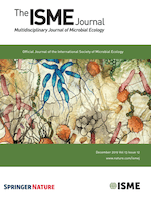
ISME Journal
Connecting the dots between evolution, behavior, and systematics.The ISME Journal, published by Oxford University Press, stands as a premier multidisciplinary platform dedicated to advancing the fields of Ecology, Evolution, Behavior, and Systematics as well as Microbiology. With its ISSN of 1751-7362 and E-ISSN 1751-7370, this renowned journal has successfully maintained a prestigious reputation reflected in its commendable Q1 rankings across both fields in 2023. It ranks #7 out of 721 in Ecology, Evolution, Behavior, and Systematics and #8 out of 182 in Microbiology, placing it in the top percentiles of relevant Scopus categories. Covering original research, reviews, and methodologies, the journal aims to foster interdisciplinary collaboration and inspire new paradigms in microbiome research, environmental processes, and evolutionary dynamics. Researchers, professionals, and students are encouraged to submit their findings to a journal that not only reaches a global audience but also influences the direction of ongoing scientific discourse. With a commitment to excellence, the ISME Journal represents an essential resource for anyone engaged in these transformative fields of study.

ORIGINS OF LIFE AND EVOLUTION OF BIOSPHERES
Charting the Evolutionary Landscape of BiospheresOrigins of Life and Evolution of Biospheres is a distinguished academic journal published by Springer, dedicated to exploring the intricate connections between biological evolution and planetary sciences. Since its inception in 1984, this journal has served as a vital platform for interdisciplinary research, fostering a deeper understanding of the origins and development of life on Earth and beyond. With an Impact Factor reflective of its rigorous scholarly contributions, Origins of Life is currently ranked Q3 in multiple categories, including Ecology, Evolution, Behavior and Systematics, Medicine (miscellaneous), and Space and Planetary Science. With a commitment to advancing knowledge in these crucial fields, the journal caters to a diverse audience—ranging from researchers and professionals to students—who are keen on delving into the complexities of life's evolution in relation to ecological and extraterrestrial contexts. Although the journal is not open access, its critical insights drive significant academic discourse and innovation, making it an essential resource for those dedicated to understanding the biospheric processes that shape the living world.
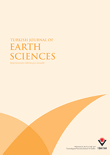
TURKISH JOURNAL OF EARTH SCIENCES
Elevating Earth Science Research to New HeightsTURKISH JOURNAL OF EARTH SCIENCES, published by the Tubitak Scientific & Technological Research Council Turkey, is a premier platform dedicated to advancing the field of Earth and Planetary Sciences. With an ISSN of 1300-0985, this journal has been a significant contributor to the international scientific community since its inception in 2002, and is set to continue publishing groundbreaking research through 2024. As a recognized journal in the Q2 quartile of Earth and Planetary Sciences, it ranks #98 out of 195 in its category according to Scopus metrics, positioning it within the 50th percentile of its field. The journal emphasizes peer-reviewed research, providing invaluable insights that facilitate scholarly discourse and promote rigorous investigation into various aspects of the Earth sciences. Although it does not currently offer open access, the journal remains a vital resource for academics, professionals, and students seeking to deepen their understanding of geological phenomena and contribute to the advancement of this essential discipline.
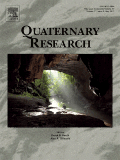
QUATERNARY RESEARCH
Bridging Disciplines to Illuminate Earth's Dynamic History.QUATERNARY RESEARCH, published by Cambridge University Press, is a leading academic journal that focuses on the study of the Quaternary Period, the most recent geological time period. With a strong emphasis on interdisciplinary research, the journal has significantly contributed to our understanding of Earth's dynamic systems and processes, making it an essential resource for researchers and professionals in the fields of Earth and Planetary Sciences, Earth-Surface Processes, and the Arts and Humanities. It is recognized for its high-impact contributions, reflected in its impressive Q1 rankings across multiple categories, including its position as 69th out of 552 in Arts and Humanities and 49th out of 195 in General Earth and Planetary Sciences, showcasing its influence and relevance in the academic community. While QUATERNARY RESEARCH does not provide open access options, it remains a crucial platform for disseminating valuable research findings and fostering scholarly dialogue. The journal's coverage spans from 1970 to 2024, serving as a comprehensive archive of key developments in the field.
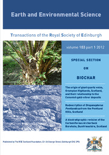
Earth and Environmental Science Transactions of the Royal Society of Edinburgh
Unveiling the complexities of our planet's systems.Earth and Environmental Science Transactions of the Royal Society of Edinburgh is a prestigious journal published by Cambridge University Press, dedicated to advancing research in the field of Earth and planetary sciences, as well as environmental science. With its ISSN 1755-6910 and E-ISSN 1755-6929, the journal has established itself as a crucial platform for disseminating innovative research and comprehensive reviews since its inception in 2007. Positioned in the Q3 quartile for both Earth and Planetary Sciences and Environmental Science, it contributes significantly to the ongoing dialogue and development in these areas, boasting a Scopus ranking that reflects its commitment to scholarly excellence with an emphasis on interdisciplinary approaches and real-world applications. The journal is based in the United Kingdom, with its editorial office located at the Edinburgh Building, Shaftesbury Road, Cambridge. As an essential resource for researchers, professionals, and students alike, Earth and Environmental Science Transactions offers opportunities for open discourse on pressing environmental challenges, fortifying its role in fostering a deeper understanding of our planet's systems and their interconnectedness.

Geochemical Perspectives Letters
Illuminating the intersections of chemistry and geology.Geochemical Perspectives Letters, published by the European Association of Geochemistry, is a leading open-access journal that has been at the forefront of geochemical research since its inception in 2015. Based in France, this journal is dedicated to disseminating high-quality, original research and reviews across the fields of Environmental Chemistry, Geochemistry, and Petrology, and Geology. With an impressive Q1 ranking in multiple categories, and notable Scopus rankings placing it among the top-tier journals in Earth Sciences, Geochemical Perspectives Letters aims to foster scientific dialogue and collaboration among researchers and professionals. Its open-access model ensures widespread dissemination of knowledge, making it accessible to a diverse audience, including students and seasoned experts alike. As the journal continues to converge research insights from 2015 to 2024, it remains a pivotal resource for those striving to understand and address the complexities of our planet's geochemical processes.
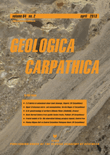
GEOLOGICA CARPATHICA
Unlocking the Secrets of the Carpathian RegionGEOLOGICA CARPATHICA, with ISSN 1335-0552 and E-ISSN 1336-8052, is a distinguished open access journal published by the Slovak Academy of Sciences Geological Institute, serving as a pivotal platform for the dissemination of research in the field of Geology. Established in 1991 and continuing through 2024, the journal is recognized for its significant contributions to Earth and Planetary Sciences, evidenced by its 2023 Scopus ranking placing it in the second quartile (Q2) within Geology. With an H-index that showcases its impactful publications, GEOLOGICA CARPATHICA is committed to fostering scholarly communication while promoting accessible research, having adopted an open access model since 2009. Located in beautiful Bratislava, Slovakia, this journal aims to engage a global audience of researchers, professionals, and students interested in ecological, geological, and environmental studies, making it a prominent resource for enriching the scientific community's understanding of the Carpathian region and beyond.
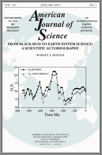
AMERICAN JOURNAL OF SCIENCE
Shaping the Future of Planetary ResearchThe American Journal of Science, published by the esteemed Amer Journal Science, stands as a leading platform for groundbreaking research in the field of Earth and Planetary Sciences. With an impressive impact factor and distinguished Scopus rank 34/195 in its category, the journal occupies a prestigious position in the academic community, reflecting its high-quality and influential contributions to scientific knowledge. The journal’s objective is to disseminate original research, comprehensive reviews, and critical discussions that advance our understanding of geological processes and planetary phenomena, supporting scholars and practitioners in their pursuit of knowledge. Despite its traditional publication structure, viewers can explore its rich repository of works dating from 1945 to present, offering a wealth of insights into the dynamic Earth sciences. The journal remains a vital resource for researchers, professionals, and students eager to engage with the latest scientific findings and foster further innovation in the field.
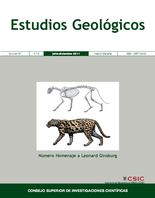
ESTUDIOS GEOLOGICOS-MADRID
Connecting Researchers with Earth’s Secrets Since 1976.ESTUDIOS GEOLOGICOS-MADRID is a prominent journal in the field of geology, published by the esteemed Consejo Superior de Investigaciones Científicas (CSIC) in Spain. Established in 1976, this Open Access journal has been a vital resource for researchers and professionals since its inception. With an impact factor reflecting its contribution to the Earth and Planetary Sciences community, ESTUDIOS GEOLOGICOS-MADRID currently holds a Q3 category ranking in Geology as of 2023, showcasing its relevance and quality within the discipline. The journal publishes a diverse array of geological studies, ensuring wide-reaching access to significant research findings, thereby promoting collaboration and knowledge sharing. Established as a platform for both foundational research and applied geology, this journal fosters academic growth and contributes to understanding the Earth’s processes. Researchers, professionals, and students are encouraged to explore its extensive archive, which includes publications from 1976 to the present. For more information, visit the journal's editorial office at Editorial CSIC, C/VITRUVIO 8, 28006 MADRID, SPAIN.